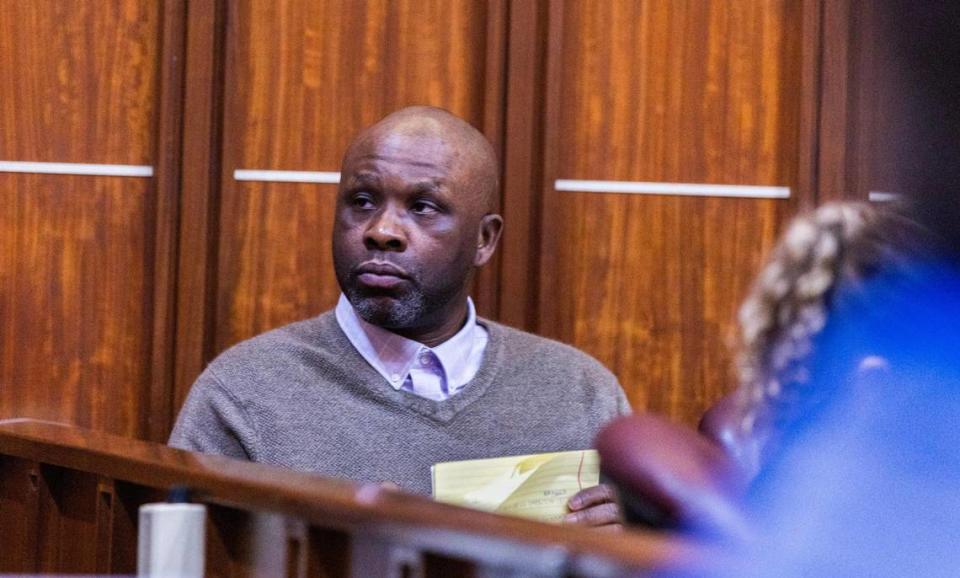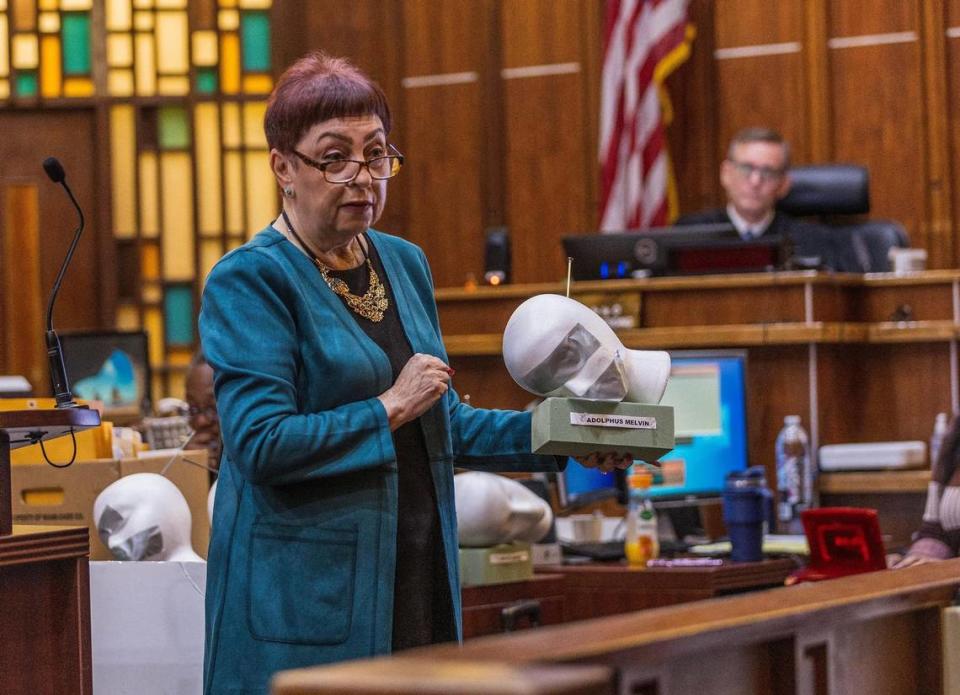Miami-Dade jury spares the life of a former death row inmate convicted of 5 murders
A Miami-Dade jury late Thursday night spared the life of a man sentenced to death 14 years ago for the execution-style murder of five people in a Little Haiti apartment almost three decades ago.
Jurors agreed unanimously that Tavares Calloway committed the murders. But they failed to meet the relatively new 8-4 vote threshold for death that was put in place last year by state legislators after Parkland shooter Nikolas Cruz didn’t receive the unanimous voted needed for a death sentence. Before the March 2023 bill passed in Tallahassee, a unanimous vote by jurors was required to send someone to death row.
Miami-Dade prosecutors were forced to retry Calloway’s death sentence after the U.S. Supreme Court struck down Florida’s death penalty law in 2016, which only required a majority vote. A year later the state supreme court ordered re-sentencings for Calloway and dozens of other Florida prisoners on death row.
Calloway is believed to be the first convicted killer of more than a dozen expected to be re-sentenced in Miami-Dade, to have his life spared under the new guideline that now makes Florida the easiest state to condemn a killer to death row. A Broward jury spared the life of convicted killer Clark Paul late last year during re-sentencing, under the new rule.
The jury’s decision for a life sentence at the end of a two-week trial came after state prosecutors and Calloway’s defense team painted polar opposite portraits of the convicted killer. Prosecutors portrayed him as a cold, calculating killer who stripped the men not only of their pants and shoes when they were murdered, but of their dignity as well.
Calloway’s defense attorneys explained how their client was a neglected child with drug-addicted and violent parents whose life began to turn around not long after the murders. They credited it to Calloway’s exploration of the church and his acceptance by the “church ladies.” Defense attorney Scott Saken told jurors Calloway learned to read and write and discuss the great philosophers like Aristotle and Plato, while he was in prison.
The jurors’ decision, which came about eight hours after deliberations began and long after most of the victims’ family members and friends had gone home, had Calloway rubbing away the tears from his eyes with his freed hands. He gave co-counsel Carmen Vizcaino a big bear hug, before being led away to jail by a gaggle of Miami-Dade Corrections officers.
“Justice prevailed,” Sarken said outside the courtroom of the man he’s been representing for at least 15 years. “This thing goes back 26 years. He’s a different person and the jury recognized it. It’s a total rejection of the state’s theory.”
Lead prosecutor Miami-Dade Assistant State Attorney Abbe Rifkin and her co-counselors left quickly after the verdict.
A poor, neglected and violent upbringing
For jurors to actually vote to send Calloway to death row, they were required to vote unanimously on at least one of five aggravating factors set before them by Miami-Dade Circuit Court Judge Miguel M. de la O. They all agreed on one of them: That Calloway committed the 1997 murders, triggering a death penalty vote.
But they failed to agree unanimously that the crimes were committed as a result of a kidnapping. Or that the murders were heinous and cruel and premeditated, or done for any type of financial gain.
They couldn’t agree on those questions despite being shown the transcript of a sworn statement Calloway gave to police after he was taken into custody in 1998, in which he admitted his guilt. He told investigators he led one man into the apartment at gunpoint, then bound all five and covered their eyes and mouths with duct tape, before shooting them in the head one at a time and stealing their drugs and money.
Instead, jurors seemed to put enough weight on mitigating factors told them by Saken that claimed his client was the poor and neglected son of a drug-addicted mother and a violent father who beat him at will.
“It was a very mitigated guy and he’s a very mitigated guy,” Saken said.

Take off their pants, lie on floor
In 2010, jurors voted by a 7-5 margin to send Calloway to his death after state prosecutors told them the story of how he and an accomplice named Antonio Clark shot and killed five men — some who were small-time weed dealers — in a Little Haiti apartment.
In his statement to police, Calloway told of how an acquaintance told him about a target for a potential “lick,” or small-time ripoff. Before the murders, the state said, Calloway and Clark purchased gloves, hats and camouflage outfits at a flea market and scoped out the apartment.
Then on Jan. 21, 1997, after watching one of the men get out of his car, Calloway told police he approached him with a gun and ordered him into the apartment, where the screen and front door were already open. When they got there, three men were eating around a table, a fourth sitting on a couch.
With the gun pointed at the man’s head as a threat, Calloway said he ordered all five of them to take off their pants and socks and lie down on the floor. Then after Clark went to the store to buy some duct tape, the men’s hands and feet were tied up and their eyes and mouths covered with the tape.
Calloway said they sat around talking for three hours, part of the time spent foraging the apartment for money and jewelry. They eventually found about two pounds of marijuana and about $600. A decision was ultimately made to kill all five of the men who could identify Calloway.
He told police he shot them in the head, one at a time. Rifkin tried to exploit that during her closing argument, showing jurors Styrofoam heads with eyes and mouths covered in tape and with markings showing where a bullet entered and left the bodies. She counted down, trying to show jurors what it must have been like for each of the men as Calloway made his way down the line.
Raising her voice, she shouted, “Bang. Bang bang. Bang bang bang. Bang bang bang bang. Bang bang bang bang bang,” until all five would have been shot and killed.

The bodies were eventually discovered by the girlfriend of one of the dead men, who told jurors she headed over to the apartment angrily because her boyfriend had failed to pick up their child at daycare. She contacted police. The trail for the killers was cold for about a year.
Calloway was taken into custody after Clark brought up his name, while Clark was being investigated by police for another homicide.
The men killed by Calloway were Adolphus “Tank” Melvin, 27, Gary St. Charles, 22, Trenton Thomas, 26, Frederick McGuire, 31 and Melvin’s visiting nephew, Derwin Bernard Copeland, 28.
Thirteen years later, Calloway was found guilty of capital murder and sentenced to death by a 7-5 vote. He was also found guilty of aggravated kidnapping, armed burglary and robbery.
During his closing argument Thursday, Saken told jurors they’ve “been given the power of God” in deciding whether Calloway lives or dies.
“We’re asking you to concentrate on the person,” he said. “The state wants you to focus on the crimes.”

